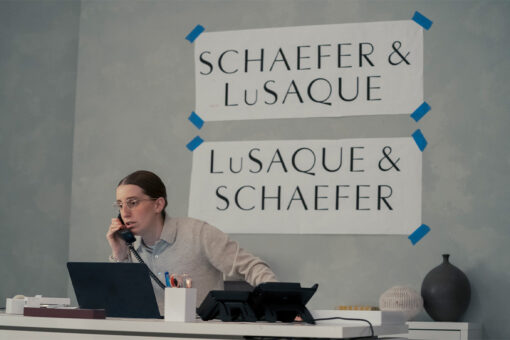“I get such bad stage fright,” Jewish comedian and actress Jenny Slate admits in her aptly named 2019 Netflix stand-up special, “Stage Fright.”
“It ruins my day,” she adds.
Chatting with Slate last week about everything from her latest film “I Want You Back” to bat mitzvah balloon arches (we’ll come back to that) didn’t ruin my day; quite the opposite, in fact. But in the lead-up to our conversation, I could certainly relate to the anxiety she describes.
I don’t think it’s a stretch to say that Jenny Slate is one of the most relatable and endearing performers of our time. From the deeply honest, semi-documentary “Stage Fright” to the roles she thrives in, ones that reflect the contemporary experience of womanhood, I think a lot of young women, and particularly young Jewish women, see themselves in Jenny Slate. I know I do.
So in the days before our call, I agonized over how everything would play out. What questions should I ask? Will they be any good? How will this conversation even start?
For Slate, that last question was simple. “Hi, is this Evelyn? Hi, this is Jenny. Jenny Slate. Hold on, sorry, I’m pulling on my pants.”
Like almost everything else I’ve heard her say, the hook was immediate. I couldn’t help but to be pulled, head first, into the world of Jenny Slate.
Jenny, who is part Ashkenazi and part Sephardic, was born in Milton, Massachusetts to Jewish parents. Though Slate clarifies that she’s now agnostic but still culturally Jewish, Judaism has always played a big role in her life.
As with many Jewish families, a point of unavoidable connection for Jenny is the Holocaust, of whom her grandmother Rochelle is a survivor. Outside of tragedy, however, growing up Slate attended Hebrew school and had what she describes as a more traditional bat mitzvah.
During her three-hour ceremony, Jenny chanted Torah and haftarah portions. Without even asking, she recalled for me that her haftarah portion included the story of Samson. “Of course my portion would be about someone getting a bad haircut,” she jokes.
Later in the evening, Jenny returned to synagogue for her party, which was held in the social hall. “I didn’t have a theme. My mom was kind of like, ‘the theme of your bat mitzvah is bat mitzvah,’” Jenny remembers. “But I was able to barter with my mom, so at the party there were some balloon arches and my colors were raspberry and teal.”
Upon voicing my surprise at the color combo, Jenny laughs, saying, “It was the ‘90s.”
But more than the party — which Jenny admits she spent mostly being nervous that her majority non-Jewish schoolmates actually wanted to be there — Jenny’s bat mitzvah holds a particular significance for her. “It was the first moment that I really felt that being Jewish was something special, something to be proud of,” she reflects, adding that at one time, she used to feel particularly insecure about her nose, though now she “loves it.”
As Jenny recounted this memory to me, I wondered when she first realized that her comedic and acting prowess are also something special. She certainly had a lot of time to figure it out; Jenny first got into theater as a child, taking part in shows at her summer camp, Camp Tapawingo in Sweden, Maine. Eventually Jenny attended Columbia University, where she met her comedy partner Gabe Liedman, started an improv comedy group and also starred in Columbia’s satirical sketch show, The Varsity Show. Following her graduation, Jenny continued to write and perform, regularly doing shows at the now defunct Upright Citizen’s Brigade and making her way onto TV with gigs like a recurring role on a “Late Night with Jimmy Fallon” sketch.
Then in 2009, Jenny scored a coveted spot as a cast member on “Saturday Night Live.” In her brief time on the show, Slate did impressions of celebrities like Lady Gaga and Kristen Stewart and even had a recurring character named Tina-Tina Cheneuse. But her contract was not renewed for the next season, and her run on the show became marked by accidentally saying “fucking” instead of “fricking” on-air during her first episode.
For some comics, getting fired from SNL is an impossible career hit to come back from — but not for Jenny Slate.
In the 12 years since SNL, Jenny’s face, and sometimes just her voice, have graced film and TV screens in iconic comedic roles like Mona-Lisa Saperstein on “Parks and Recreation,” Liz in the PubLIZity sketch from “Kroll Show,” Tammy Larsen on “Bob’s Burgers” and the Black Jewish character Missy Foreman-Greenwald on “Big Mouth” (which she stepped down from this past year, saying her reasons for taking the job were “flawed” and that “Black characters on an animated show should be played by Black people”). Jenny has also successfully straddled the line between comedy and drama with roles like Donna Stern, a struggling stand-up comedian whose one-night stand precipitates an abortion in the critically acclaimed film “Obvious Child.”
In “I Want You Back” from director Jason Orley, Jenny’s latest project is yet another fun showcase of her talent.
Much in the same way our phone call began, “I Want You Back” immediately captures the audience’s attention through Slate’s storytelling. Panning down from a shot of downtown Atlanta, we, the viewers, find ourselves in a restaurant’s cute backyard. Emma (Jenny Slate) and her boyfriend Noah (Scott Eastwood) are brunching as “I’m Yours, You’re Mine” by Marvin Gaye and Mary Wells transitions into restaurant chatter. Breaking through the ambient noise is the first line of the movie, belonging to Slate. “And I swallowed really quickly, and half the mozzarella stick got lodged, and the other one was still in my hand with the connecting cheese, and I had to have the Heimlich,” Emma tells Noah. “It was like… it ruined the whole bat mitzvah.”
In case you were wondering, no, that doesn’t necessarily mean Emma is Jewish. “You know, I’ve never thought of Emma in a religious or spiritual way,” Slate tells me. “I told that story because it’s something that actually happened to me. It was my first full day on set, I had just met Scott and I was still getting a sense of the character.”
Even so, the throwaway line makes for an intriguing beginning for the delightful, Nora Ephron-esque rom-com. “I Want You Back” tells the story of Emma and Peter (Charlie Day), two recently dumped 30-somethings who meet and conspire to help the other win back their ex. While the entire cast delivers stellar performances, Slate’s Emma has some particularly stand-out moments.
In my personal favorite scene of the film, Emma, in an attempt to get close to Peter’s ex Anne’s (Gina Rodriguez) new boyfriend Logan (Manny Jacinto), finds herself performing the role of Audrey in “Suddenly Seymour” in a middle school production of “Little Shop of Horrors.” (Funnily enough, unlike her character, who lies about having played Audrey in high school, as a child Jenny actually was in the chorus of “Little Shop of Horrors” at camp.) For Jenny, who loves both to sing and the musical “Little Shop,” it was an exciting and daunting challenge. “I’ve sung in character, in a comedic way, on ‘Bob’s Burgers’ and ‘Big Mouth,’ but this was the first time that I had been asked to sing seriously,” she explained. “And with a show like ‘Little Shop of Horrors,’ which has so much history, I was a bit nervous that viewers would be upset with my performance.”
Ultimately, Jenny feels a lot of love for “I Want You Back,” calling it one of her “favorite filming experiences” of her career. “I felt really taken care of on set,” Jenny tells me, citing a moment in which her character almost has a threesome with Logan and Anne. While the scene doesn’t actually include sex, Jenny explains that they still rehearsed with an intimacy coordinator, someone on set whose job it is to ensure the well-being of actors performing in intimate scenes. While an intimacy coordinator is always an important member of production, for Jenny this staff member was especially necessary. “I was feeling really protective of my body, especially my boobs, because I actually had mastitis at the time,” she explains.
The mastitis, or an inflammation of breast tissue, was a postpartum result of the birth of Jenny and her husband Ben Shattuck’s daughter Ida Lupine in late 2020. Knowing that she was working through life as a new mother — which Slate has described as “the most meaningful thing that has ever happened” to her — and all of its physical and emotional demands makes Slate’s busy working life all the more impressive. Slate’s next film, “Marcel the Shell with Shoes On,” will be premiering at the 2022 SXSW Film Festival this March.
Marcel the Shell, whom you may know from the 2010 viral short film and sequels on YouTube, is a tiny seashell with large pink and white shoes, co-created by Slate and her ex-husband Dean Flesicher-Camp. In the short film, Marcel (voiced by Jenny) is followed around by a documentary filmmaker (voiced by Fleischer-Camp) who asks Marcel the Shell questions about his daily life. (If you’re wondering, when I asked Slate what it’s like to play a character that’s treyf, or not kosher, she politely pushed back, saying he’s more of a personality in a shell than a shellfish. When I followed-up, asking if it was possible that Marcel is Jewish, she indulged me, responding, “That’s not for me to say.”)
The long road to making the Marcel the Shell movie all started in a crowded hotel room, which Jenny and Dean were sharing during a wedding weekend. “I started doing the voice to express just how little I felt,” Jenny tells me. “It was the one voice I didn’t do on SNL, because I had done a lot of voices to try to save my job. But somewhere in my psyche I must’ve known that I needed to save this one for myself.”
After they got back from the wedding, Dean asked if he could interview her in the voice, saying he intended to overlay the audio on shots of something else. “I must’ve gone out for lunch and Dean made him when I was gone. When I came back, Marcel was sitting on the kitchen table, just as he is now,” Jenny lovingly describes. “That’s how he came to be.”
Finding a whole feature film in that character of Marcel was a deliberate and careful process. Over a long period of time, Jenny and Dean, along with writer Nick Paley, shaped the script based on recording many pieces of audio of the Marcel voice and identifying where a story could go. Though Jenny shares no more of the feature film plot then what we know already, the film has already received praise from critics like Variety’s Peter Debruge, who writes, “It’s hard to believe that a googly-eyed shell and a silly voice can sustain an entire movie, and yet Jenny Slate’s adorable creation proves irresistible.”
In the dwindling moments of our call, Jenny describes Marcel as a character that is “earnest but doesn’t take himself too seriously.” It’s a pretty apt description of Jenny herself. During our conversation, she gave thoughtful, deep answers to all my questions while also being somewhat silly at times, at one point using the Nana Connie voice from “Stage Fright” to quote her grandmother. In those moments it became clear to me that she is the master of holding those two opposing ideas within herself and using it to create some of the most joyful, irreverent and yes, Jewish, comedy out there.
As we hang up, Jenny thanks me and wishes me a lovely day. But as you can tell by now, my day was already going quite well. There’s perhaps nothing more lovely than existing in the world of Jenny Slate.



